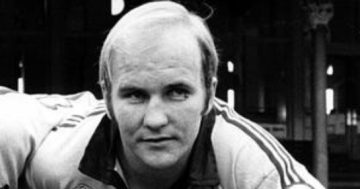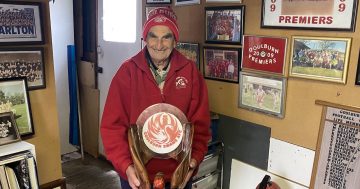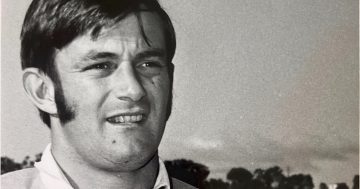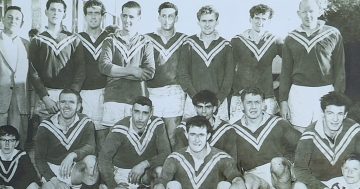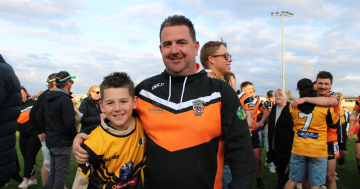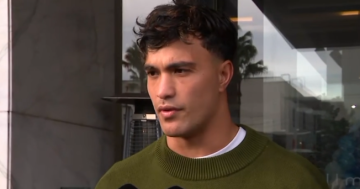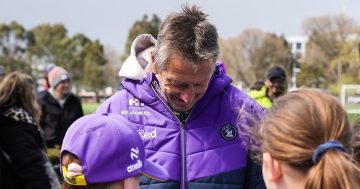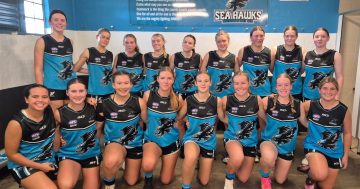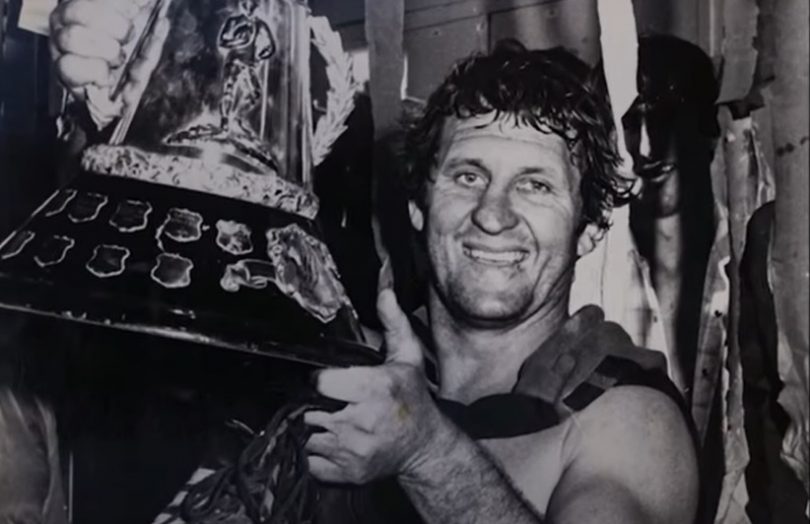
Former Young Cherrypicker David “Chook” Howell, achieved an unprecedented seven premiership wins during his career as a league footballer. Photo: Supplied.
If there was a man to be feared on the football field back in the 70s it was David “Chook” Howell.
Howell was tough in a time when the fight for premierships was a hand-on-heart backyard turf war, where players worked by day, lived by one set of colours and played the full 80 minutes in a game governed by the four-tackle rule, where scrums proliferated and mid-game melees were like froth to a beer.
Young and Newcastle league legend David Howell has now moved on to the great football field in the sky after a long fight with Parkinsons disease. He was 68.
Never has a league player who never played first grade had such standing in the sport.
The death of this man of steel, from a city of steel, has devastated anyone who witnessed his relentless pursuit of the ball, a point, an opponent or a win in any match he played.
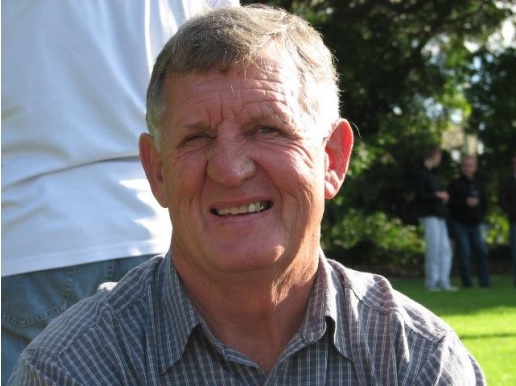
Howell’s association with Newcastle’s West Rosellas continued long after he retired from football, with a vast social and sporting life aligned with the club.
But his passing revealed another side to the footballer. In donating his brain to the study of sporting-related brain injuries, he leaves a legacy that paves a safer passage for future footballers.
David Richard Howell was born to Daphne and Charlie Howell in Young on 29 April 1951. The youngest of six children, he attended Christian Brothers High School. Raised in a house on Young’s famed league home ground, Alfred Oval, David grew up with real footy posts and a grandstand in his backyard.
An outstanding rugged schoolboy player, Chook (Howell to Fowl to Chook) excelled in either the lock or five-eighth positions, playing for Young Cherrypickers Under-16s and Under-18s, all resulting in grand final wins.
After a couple of seasons in Forbes, he returned to the ‘Pickers where they took out the 1974 premiership.
A chance meeting with Allan Buman, known as the Prince of Hookers, played a part in transitioning David’s league career to the Newcastle Rugby League competition in 1977.
Allan Buman said when Wests went down to look at David, he coat-hangered front rower John Cobain in the first seconds of a game against Temora and was sent off.
“So, naturally, they weren‘t impressed and went home,” he said.
After some pleading from Allan, David joined Wests.
“He went on to be one of the best players Wests ever had,” Allan said. “He gave as good as he could take, he never complained – they hit him as hard as he hit them.
“As a coach, he got on well with all the men because he led by example – he was the right man at the right time for Wests.”
The seven years David played (1977-1983) with the formidable West Rosellas amounted to 116 games (114 in first grade), 10 tries and four premierships, one of them as captain and three as captain-coach.
His premiership record is one fellow footballer Tony Slack-Smith says is likely unprecedented.
“What he achieved in Newcastle was incredible,” Tony said. “That was a very hard competition at that time and he got four premierships. Some teams go 50 years and don’t win a grand final.
“I don’t think you could find anybody else in Australia who has won seven premierships over their footballing career.”
David represented Riverina, Newcastle and NSW Country. One time against City, for the wrong reasons, he was sent off in the first two minutes for hitting St George legend Craig Young. In a match against England, the opposition suggested David shouldn’t return after halftime as he wouldn’t survive, such was the havoc he’d caused.
In 2010 David took his place amongst West greats when he was selected in West’s ‘Team of the Century’ alongside Rugby League Immortal Johnny Raper and John Cootes.
ABC league commentator Craig Hamilton remembers him well. In fact, he still lives in a house he bought from David Howell 30 years ago.
“I was out covering a country grand final and I ran into Les Boyd,” he recalls. “He asked me if I knew David Howell, whom he went on to describe as the toughest player he had come up against.
“You can’t get any greater praise than that from one of league’s toughest players.
“He was an enigma really. On the field, he was this tough aggressive player and away from football he was lovely, very quietly spoken and charming.
“If someone was in trouble he would help where he could. He wasn’t of means but he was generous and loyal.”
Les Boyd rose through the ranks with David.
“I was a 17-year-old when I first started playing for Cootamundra and David was one of my first adversaries,” he said.
“It was probably an initiation of fire playing against him. He was an exceptional player – he wasn’t a big man for a rugby league player but exceptionally tough. And he got a lot of treatment back, but he never complained. He kept playing the same way and at the same pace all day.”
Both were invited to trial for Western Suburbs in 1976.
“They wanted to take us both and didn’t have enough money. As luck turned out they took me and David returned home to play for Young,” Les said. “He was probably a bit small, even though he played unbelievable football. He played the game above his own weight.”
Balmain Tiger turned Cherrypicker Jimmy Bonus recalled a game in Tumut where David raised the ire of league legend John Hobby who asked Jimmy to tell David to back off. David didn’t. But testament to David’s off-field character, later, over beers, John’s outrage vanished and a friendship forged.
“He was a great harmoniser,” he said. “He was just one of those extraordinary players who could turn a game or win a game, but I heard this week that Les Boyd once said he would rather be playing with him than against him.”
That tenacity came at a cost.
In his early sixties, David was diagnosed with Parkinson’s Disease, attributed to an estimated 12 to 15 concussions during his footballing years.
But this also led David to Newcastle-based neurologists Associate Professor Andrew Gardner and Professor Chris Levi, experts in the field of concussion-related injuries.
David was one of the first and a very willing participant in an ongoing brain health study of retired professional rugby league players, involving three-monthly assessments and brain scans until his condition advanced.
“David was extremely generous with his time and more than willing to assist even though he was struggling with the symptoms he was experiencing at the time,” Associate Professor Gardener said.
His final gift to them – his brain and spinal cord – has allowed the team greater insights into David’s disease which they’ll correlate with data collected while he was still alive.
“He was renowned as a tough player and he attacked the disease the same way as he probably did his football game,” Dr Gardener said. “He was active and worked longer than anyone with a similar presentation.”
Long-time friend Doug Schofield said David’s post-league pursuits of woodwork, sailing, surfing, tennis and golf eventually gave way to the disease.
“He was very family orientated, had a lot of time for my kids, had a lot of time for everyone. Always helping people out and he was very, very generous with his time.”
It was a generosity that was reciprocated in David’s final less agile years. Friends would pick him up to take him to Wests games, buy him a beer, a hamburger and David would offer critique, often to the coaches.
A service was held in Newcastle on Wednesday, David’s birthday. Another graveside service will be held at Young on Friday. The cortege will detour past Alfred Oval one last time before taking David to the Young Lawn Cemetery.







